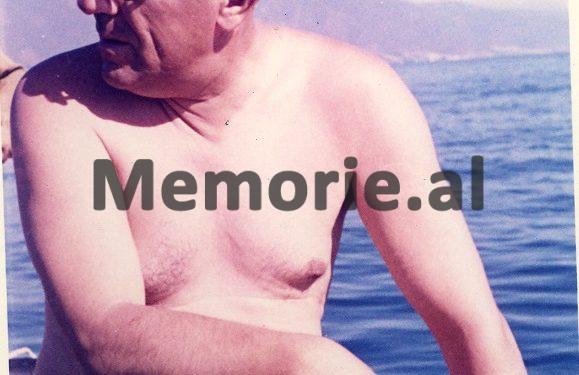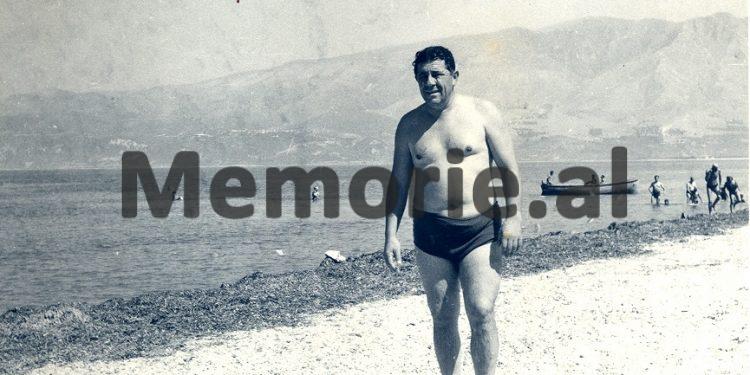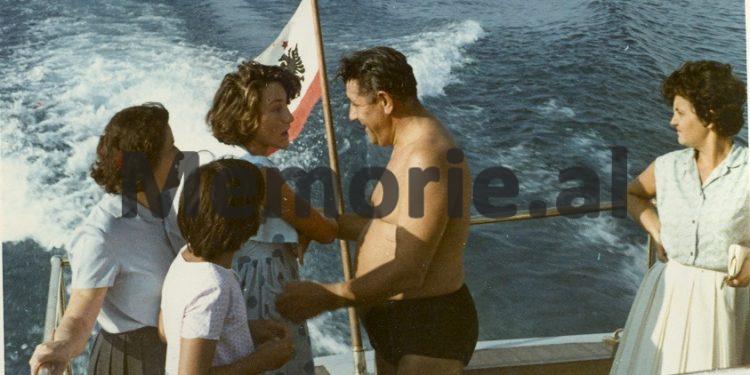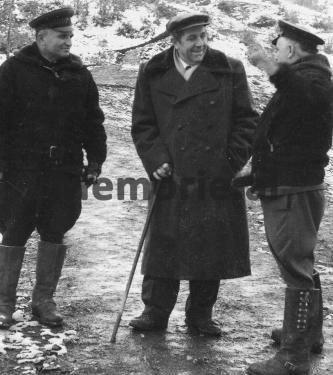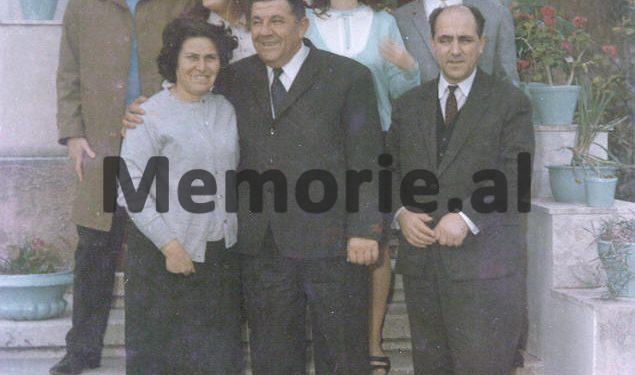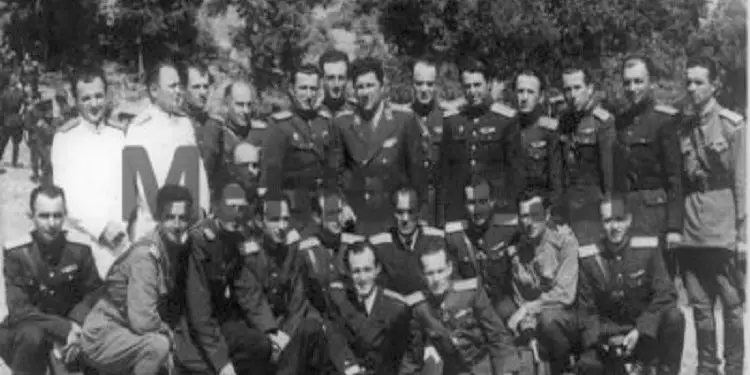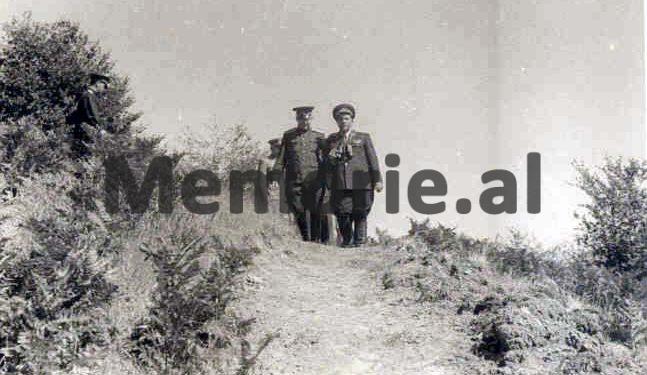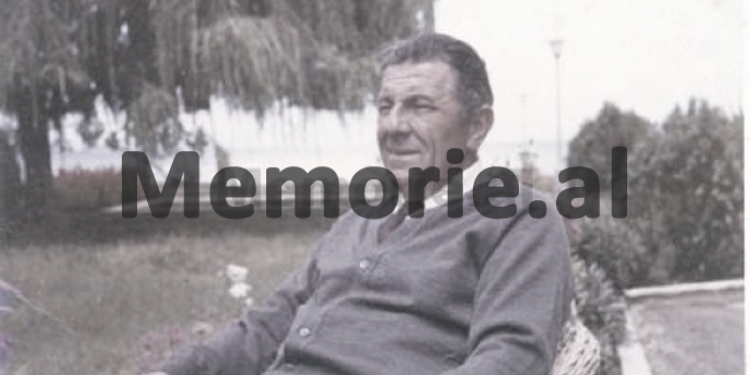Dashnor Kaloçi
Memorie.al publishes the unknown story of Beqir Balluku, former Minister of People’s Defense, member of the People’s Assembly, member of the Political Bureau of the Central Committee of the ALP and first deputy prime minister of the government led by Mehmet Shehu, who was shot in a secret tunnel on the outskirts of Tirana near the village of Linza on November 5, 1975, after being sentenced to death by the Supreme Court of the People’s Republic of Albania, accused of being “the leader of a coup group in the army”. Rare testimony of Çlirim Balluku, the eldest son of the Balluku family, since the origin of the family, the period of the Zog Monarchy, his activity during the Antifascist War, schooling, functions and duties after 1945, relations with Enver Hoxha, Mehmet Shehu, Hysni Kapon, Gogo Nushi, etc., from the senior leadership of the ALP, as well as why the criticism and attack on him began in 1974, who were the ones who attacked him the most in the first meetings, what was he told his children when he returned home after being attacked as an “enemy of the people”, his internment and family, the execution together with his two subordinates, Petrit Dumen and Hito Çako in one of the secret tunnels of Linza on the outskirts of Tirana, how the family learned that when he was in exile, until the many vicissitudes after the ’90s to find his remains in the village of Vranisht in Vlora, where they were buried by order and under the care of Kadri Hazbiu.
“The crackdown on our father, Beqir Balluku, who for years held the post of Minister of Defense and First Deputy Prime Minister in the government headed by Mehmet Shehu, began in June-July 1974 with the extended meeting of the Army Assets, which was held in Villa Zogu of the city of Durrës. The blow against him was prepared on the basis of a scenario well designed by the main leaders of the high “pyramid” of the ALP, with special people within the ranks of the Ministry of Defense. This is also confirmed by the fact that the accusations against him started at a time when the material with the theses that were to be submitted for discussion in the Defense Council, had not yet been made public and were locked in the safe of the office in the Ministry of Defense. After that, he was analyzed in the meetings of the Politburo where Enver Hoxha was the first to direct the attacks on him, accusing him of being the biggest traitor that Albania had until then. After those meetings of the Politburo, the father was analyzed in the Fifth Plenum of the Central Committee of the ALP, which was held on July 25, 1974, where he was attacked by someone more and someone less. At the end of that Plenum he was expelled and dismissed from all party and state functions. After that meeting, the father was not arrested like many of the former senior personalities of the top communist leadership who had been beaten years ago, but was released to come home. I remember as now when my father came home after that meeting and told us everything that had happened at that Plenum, as well as the decisions that had been made there in the address of his person. At the heart of those words that our father told us that afternoon in our house, where all of us family members had gathered, was that he was not a traitor and had never betrayed the Party and Enver Hoxha. After that day, the father stayed for another ten days without leaving the house at all, as even those who hit him had not yet decided where they would send him. During those ten days that my father did not leave the house at all, near our villa in Bllok, the security measures were strengthened, which was evident from the addition of the Guard soldiers. During that time, in the conversations he had with us, for the first time Beqiri spoke openly against the senior leadership of the Party, telling us that it was hitting him in vain and everything that was said in his address was manipulated “.
Testimony for Memorie.al, Çlirim Balluku, the eldest son of the former Minister of Defense, member of the Politburo and the first deputy prime minister in the communist government headed by Mehmet Shehu, who tells the whole unknown story of his father , Beqir Balluku, considered one of the most popular leaders of the communist regime of Enver Hoxha, who was shot on November 5, 1975 in a secret tunnel on the outskirts of Tirana near the village of Linza, along with his two subordinates, Chief of Staff Petrit Dumen and Political Director of the Army Hito Çako.
Who was Beqir Balluku, what was his origin and past and where was he educated? How did Beqiri first associate with communist groups, who were his closest comrades during the War and how did he first meet Enver Hoxha in 1943? What were the accusations made against Beqir Balluku by Enver Hoxha at the meetings of the Politburo and the Fifth Plenum held on July 25, 1974 and what was Beqiri told to his family after that meeting where he was expelled from all party functions of state? What happened to Beqir during those ten days that he remained isolated in his Block villa, who was the only man who could enter his house and what orders did he give to his children? What did the party secretary of the Albanian Radio-Television, Liberation, ask Beqir’s eldest son, when he called him to his office and what was the answer he received from him? How was Beqir removed from his Bllok villa to be interned in Roskovec, Fier, and how was he arrested on December 7, 1974 when he was interned in Selenica, Vlora? How did the Balluku family learn of Beqiri’s execution and how were they treated from that period until 1991 when they remained interned in Selenica, Vlora?
Çlirim Balluku, is the eldest of six children of Beqir Balluku, former Minister of Defense, MP, member of the Politburo and First Deputy Prime Minister in the communist government of Mehmet Shehu, who remained in those high positions until 1974, when he was accused and beaten by Enver Hoxha, calling himself a saboteur, enemy and leader of the “Military Coup” that aimed at the violent overthrow of popular power in Albania. As the eldest of the Balluku family, Liberation remembers him quite well and has experienced many of the events of that distant time when his father was at the highest peaks of the communist regime of Enver Hoxha, as well as later when he was attacked by Enver on the most serious charges, which have already been made public to the wider reader by numerous publications in the daily press after the 1990s. Based on this fact and to get to know even more with the unknown side of the figure of Beqir Balluku and his family, in the continuation of dozens of articles of this nature that have found a place in the pages of Memorie.al, we ‘ We addressed a long interview to Mr. Çlirim Balluku, which we are publishing starting from this issue.
Followed by the last number
Mr. Çlirim, it is said that Beqir Balluku until 1974, was the most trusted man of Enver Hoxha, and that was related to the fact because he saved Enver twice. The first case concerns the year 1948 when Josif Broz Tito asked Beqiri to sign the order for the acceptance and introduction of two Yugoslav military divisions within our border in the area of Korça, which Beqiri refused. While the second case concerns the year 1960 when Albania was breaking relations with the Soviet Union. One of the members of the Politburo of that time, testified for Memorie.al, saying that at the time when Enver, Hysniu, Mehmeti, Kadriu and Ramizi were in Moscow, the Soviet military attaché who was in Tirana, provoked him while drinking Beqiri saying: “How do you say, let’s leave out the four of them and give you the keys of Albania”? And to the very clear insinuation of the Soviet military diplomat, Beqiri answered bluntly: who are in Albania ”. Do you know the truth about these two events?
I can say that for these two events I have naturally heard in special moments from different persons (not of the top leadership) who today after so many years I can not clearly and accurately determine who they were . But I think the fact, d.m.th. who those persons were who spoke in the presence of the father about those two historical moments, where other family members were also present, does not matter much. But I noticed that regarding the story of those two events and their argumentation, the father, Beqiri, did not like to be discussed at all and the people who opened the conversations about them, he immediately interrupted them by moving the conversation to other issues. Of course not being familiar with those events, especially that of 1948, out of curiosity of age, I was interested in learning something more than what I had heard from the mouths of those persons I mentioned above. Based on what I said and also on the political and international personality enjoyed by the then leader of Yugoslavia, Marshal Josif Broz Tito, I had secretly asked my father what the truth was about that event. And the answer of the father was what I am telling you in my own words, according to what I remember from the conversation with him. During a working visit to Belgrade, sometime around 1948 when his father was in the position of Chief of General Staff of the Albanian Army, Marshal Tito had invited Beqiri to a meeting, outside the program of visits and working meetings that he had previously planned departure from Albania to Belgrade. During that conversation, after expressing concern about an obvious danger that could come to Albania from its southern neighbor, Greece, Josif Broz Tito, had asked Beqiri that he, in the capacity of Chief of the Albanian General Staff, sign a document where it was said that he agreed to the introduction of Yugoslav troops within Albanian territory. We must keep in mind that this moment, ie the search for the signing of that document, refers to the time when Josif Broz Tito was declared and considered as the greatest friend of Albania.
What was Beqir Balluku’s response to that request made to Josif Broz Tito?
The answer given by Tito’s father was this: “Albania is not in any danger of being attacked by Greece, but even if that happens, we are able to defend our own borders with all our military arsenal. that we have. “But the most important thing is that I am not authorized to sign such a document.” Perhaps this story we are talking about is related to another unknown event that has to do with the crash of the Yugoslav military plane with which the father was returning from Belgrade to Tirana after the end of that visit. During the flight by plane to Tirana, the Yugoslav pilot made a forced landing somewhere in a cultivated field near Lake Pogradec. This happened, our mother, Taibja (wife of Beqir Balluku) remembered as long as she was alive, with the fear she felt in those moments when she learned about the event that had happened to her father on the Yugoslav plane.
What about the next event, that of 1960 with the Soviet military attaché in Tirana, what can you tell us?
As for the event of 1960, what he says about the crisis that had involved Albania’s relations with the Soviet Union, I have heard them from others, as at that time, or I have read them in the Albanian press after 90s. Regarding what you asked, I think that the form in which the father responded to the Soviet attaché (general) in Tirana, after the provocation or suggestion he made, is of little importance, because the content of the answer he gave is of the utmost importance. Beqiri to him. But, as I expressed somewhere above during this interview, I wanted to add that: given the great commitment of the father during those events, I remember very well that we as children, felt his absence in the family.
What about the other major military men, former generals and colonels who were also his subordinates, what relations did Beqiri have, who had the closest friend among them and did they come to your house?
For this it is better to ask the senior ex-military, but nevertheless I can tell you that from the casual meetings I have had with them, it has not been difficult to suddenly feel their great sympathy and respect for his. I believe this is enough to understand quite well the relationship that the father had with his subordinates and other senior ex-servicemen, to whom he never made distinctions and considered them all the same. But I wanted to emphasize that Pogradec remained my father’s favorite vacation spot.
Where did Beqiri and your family usually spend their long summer vacations?
The father and his family usually spent their summer holidays on the beaches of Pogradec, Vlora and Durrës, where other former high-ranking officials usually did. In a single case, before the breakdown of state relations with the Soviet Union, our father Beqiri spent his family vacation in Czechoslovakia, because he had a close friendship with the Minister of Defense of that state, who invited our father to he spent his holidays there with his family. But this was an exception and after that, the father also invited his Czech counterpart who came to Albania and returned the visit.
What were Beqir Balluku’s favorite games and entertainments and who did he play with other top management personalities?
As for various games like billiards, chess, backgammon, or cards, our father did not play them at all because he did not like them. In our house we did not have billiards at all and even the father did not play cards. This was probably due to time constraints as well, as he spent most of his time at work. Dad had a daily routine almost with a strict schedule. At eight o’clock he went to the office and came home at four o’clock, where after eating lunch, he went back to work and worked a few more hours. The little free time he had left, his father spent at home because he was very attached to the family. The father had established very close relationships with us children and kept no distance at all. He was very communicative and could talk to her quite freely without creating any distance.
What were your dad’s favorite sports?
His favorite sports were hunting, football but also swimming, because his father swam very well. In view of different periods and ages, he practiced them and later also tennis. From the first years after the war or even later when his father was younger, he would go out to the “Dinamo” stadium, or to any other gym and play football, mainly in the evenings. This is what I said he did when he was young. Rarely did the two boys accompany him, me and my other brother, Ladin, because we too were involved in athletics and football as children. In addition to football, my father also played tennis at the United Officers’ School with Petrit Dumen (Chief of General Staff) and Abdyl Këllez (Deputy Prime Minister) and rarely at the Partizani Club.
It is said that Beqir Balluku was a very big fan of “Partizani” and did a lot for the team that represented the People’s Army?
I want to tell you that someone who has been involved in sports once, or who knows it, can not be a fan. He knew football since the time of the greats Riza Lushta and Naim Kryeziu, whom he had known personally. During the 1960s and ’70s, the father received at home both Loro Boric, who was the coach of the “Partizani” team, and Lym Alla, who was the coach of Tirana. Of course being Minister of Defense, he was interested not only in football but also in all the other sports of that sports club.
What about music, books and art in general, was Beqir Balluku connected?
My father has often read various artistic and historical books and he loved art and especially music. He did not only like the music of Central Albania, but also had preferences for Italian operatic music and world music masterpieces, which he listened to with great attention. We had a lot of old gramophone records and record shirts with that kind of music my dad listened to with pleasure. Likewise, when the first tape recorders arrived, my father started collecting many tapes, some of which I had recorded when I was working for the Albanian Radio-Television in the years 1970-‘74.
Was your father at all liberal, or did he deviate from the conservatism?
I think for the time being it has been liberal. At that time when we children were at a young age and listening to foreign music on the radio or tape recorders, my father never warned us and never stopped us, when it was well known that they were forbidden. I also wanted to add that in my social circle there were those with “unclean” biographies, who also came to our house. At that time, as a friend of mine, Hans Bekteshi, Arshi Pipë’s nephew, also came to our house, but my father never attracted my attention, on the contrary, he met him cordially even though he knew very well who he was.
You are one of the older children of the former “Bllok” and at the same time you got married earlier than the other. How many people were invited to your wedding and who was one of the top personalities of the communist leadership?
There were no guests at our wedding dinners from senior leadership personalities, because at dinners are invited friends and those who have invited you to such joys. Our two weddings were done as they were done in the people and as they are done today. The father suffered and respected the Albanian tradition. As for the home visit, of course the personalities also came.
Did your father Beqiri want to get married in “Bllok” and did you children have encouragement from him in this direction, so to connect with the girls of “Bllok”?
In this respect the father has never interfered in our private lives and respected our choice. My sister Drita and I connected with ordinary people and my father liked her about.
The unknown history of Beqir Balluku and his family from 1945 to 1974
He held the position of Tirana District Commander, which was given to Beqir Balluku due to the great contribution he had given during the War, until 1946, when at that time he was transferred from Tirana to be appointed to the position. of the Commander of the Korça Division. The transfer of Beqir Balluku to that position was made because at that time in the neighboring country, in Greece, the civil war had intensified between the government forces of Prime Minister Caldaris and those partisan communists led by Niko Zaharjadhis and General Markos Vafjadhis. As a result of that civil war, there were riots on the south-eastern border of Albania, which was entrusted to the Korça Division commanded by Colonel Beqir Balluku and Commissar, Panajot Plaku. In that position, Beqiri remained until 1948 and at that time he was called to Tirana to replace Mehmet Shehu in the position of Chief of the Albanian General Staff, at the General Command of the Army commanded by Army General Enver Hoxha. At that time, Beqiri together with his wife, Taibe Kafazi, with whom he had been married since the end of 1944, settled in one of the villas of “Bllok”, which was located very close to that of Enver Hoxha. After his appointment as Chief of the Albanian General Staff, Beqiri was promoted to brigadier general, and at the First Congress of the Communist Party of Albania held in November 1948, he was elected a member of the Central Committee of the SNP. the. Beqiri held the position of Chief of General Staff until 1951 when he was sent to study at the Voroshilov Military Academy in Moscow, which he graduated from in 1955. Even while he was studying in the Soviet Union, was not replaced in the position of Chief of Staff, but continued to hold that high position, returning from time to time to Albania. In 1953, after Prime Minister Enver Hoxha was relieved of his posts as Minister of Foreign Affairs and Minister of Defense, Beqir Balluku was appointed Minister of People’s Defense. Also in 1953, Beqiri was elected a member of the Political Bureau of the Central Committee of the ALP. Since 1956, in addition to the function of Minister of Defense, Beqir Balluku was given the function of First Deputy Prime Minister in the government headed by Mehmet Shehu, tasks which he held until July 25, 1974. Likewise Since the accession of Albania to the Warsaw Pact, Colonel-General Beqir Balluku has held the position of Deputy Commander of that Treaty, as have all the ministers of other member states (of the Communist East) that acceded to that military pact. Since 1956, Beqir Balluku was considered the closest and most trusted man of the First Secretary of the Central Committee of the ALP, Enver Hoxha and at the same time his right wing. From the marriage with Mrs. Taibe Kafazi, Beqiri had six children: Çlirimi, (1945) Vladimir, (1949) Drita, (1950) Agimi, (1952) Lulja, (1954) and Agroni (1956). From 1947 to 1961, Beqir Balluku and his family lived in several different villas in “Bllok” and after 1961 until 1974, due to expansion after their children grew up, they were settled in the villa opposite that of Enver (where today is located “Kafe REX”) Until 1974, the two eldest sons of the Balluku family, Çlirimi and Vladimiri, as well as the eldest daughter Drita, had graduated from the University of Tirana in the following branches: Electronic Engineering, Civil Engineering and Political Science while the other three children, Agimi, Lulja and Agroni, went on to high school or high school. After graduating from university, the eldest son of the Balluku family, Çlirimi, from 1970 to 1974 worked at the Albanian Radio-Television, while Vladimir at the Institute of Military Studies in Tirana. Also in addition to studies, both Liberation and Vladimir who at a very young age were involved in sports, being very well known names, in athletics where Liberation was the national champion in several competitions, and in football where Vladimir was active as one of the strong points of the “Partizani” team. Even the Minister of Defense, Beqir Balluku, at that time was well known as one of the supporters of the football team “Partizani”. He took care to create all the conditions for the footballers of that team as well as the gathering of quality athletes from other teams./Memorie.al
Continues tomorrow




